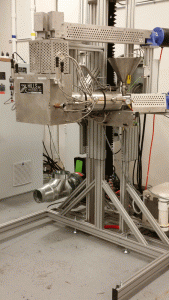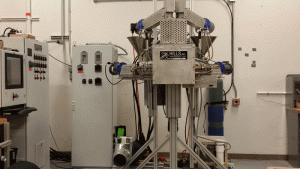 RALEIGH, N.C. — December 14, 2018 — The Nonwovens Institute at North Carolina State University (NWI) and Hills Inc., West Melbourne, Fla., are pleased to announce the delivery of a Hills LBS-300 to NWI. The LBS-300 is an exceptionally versatile and compact machine — with a footprint of approximately 5 feet by 5 feet, and an elevation of approximately 8 feet — that is designed for research and development of raw materials and extrusion processes related to filament, fiber, and nonwoven products. The design allows the LBS-300 to be quickly and easily adapted to practically any fiber extrusion process. A base LBS-300 unit simply extrudes, quenches, and winds undrawn fibers, utilizing as few as 8 grams of polymer chips. However the LBS-300 at NWI is supplied with many optional LBS attachments for conversion to numerous additional extrusion processes. Such options delivered with the machine include:
RALEIGH, N.C. — December 14, 2018 — The Nonwovens Institute at North Carolina State University (NWI) and Hills Inc., West Melbourne, Fla., are pleased to announce the delivery of a Hills LBS-300 to NWI. The LBS-300 is an exceptionally versatile and compact machine — with a footprint of approximately 5 feet by 5 feet, and an elevation of approximately 8 feet — that is designed for research and development of raw materials and extrusion processes related to filament, fiber, and nonwoven products. The design allows the LBS-300 to be quickly and easily adapted to practically any fiber extrusion process. A base LBS-300 unit simply extrudes, quenches, and winds undrawn fibers, utilizing as few as 8 grams of polymer chips. However the LBS-300 at NWI is supplied with many optional LBS attachments for conversion to numerous additional extrusion processes. Such options delivered with the machine include:
1. Multifilament spinnerets with orifices to produce the following external fiber cross sections:
a) Solid round;
b) Hollow round; and
c) Trilobal.
Spinnerets for extruding virtually any other external fiber cross section can be added later.
2. Multifilament bicomponent fiber spinning with metering/distribution plates to produce the following internal fiber cross sections:
a) Sheath/Core;
b) Side x Side;
c) Tipped Trilobal;
d) 16 Segment Pie;
e) 36 Islands-In-the-Sea; and
f) Blocking plate assemblies for reducing spin holes from a quantity of 72 to various lower spin hole counts.
Multicomponent Metering/Distribution plates for extruding virtually any other internal cross
sections can be added later.
3. Monofilament extrusion capabilities for extruding, water quenching, and winding homopolymer and bicomponent monofilament with the following included:
a) Spinnerets for extruding solid round, hollow round, and trilobal cross sections.
b) Bicomponent Metering/Distribution plates for extruding sheath/core, side by side, and tipped trilobal cross sections.
Additional spinnerets and metering/distribution plates can be added later to extrude practically any other cross sections.
 4. Meltblown dies for extruding homopolymer and bicomponent meltblown fibers along with meltblown fabric forming, bonding, and winding equipment. Fabrics with fibers to <250 nanometers diameter can also be produced.
4. Meltblown dies for extruding homopolymer and bicomponent meltblown fibers along with meltblown fabric forming, bonding, and winding equipment. Fabrics with fibers to <250 nanometers diameter can also be produced.
5. Spunbond open systems aspirator for high speed stretching of spun fibers along with spunbond fabric forming, calender bonding, and winding equipment.
6. Adjustable spinning height to accommodate spinning a broad range of fiber sizes and polymers.
7. High temperature extrusion to 450 °C.
8. Special materials to accommodate extrusion of corrosive polymers.
9. An adapter for use in coating of previously manufactured thread lines of practically any type.
10. Special design to accommodate use of existing NWI equipment for making fully oriented yarns.
11. HillsWare HMI for storing and analyzing data from spinning trials.
The LBS-300 is an exceptional tool for research and development as will often be the use at NWI, but in the hands of NWI it will also be a fantastic educational tool for training NWI students and industry personnel in fiber extrusion and melt spun nonwovens fabric production.
Hills and NWI intend to expand their cooperation by adding even more features to the LBS as future needs arise.
Posted December 17, 2018
Source: NWI




